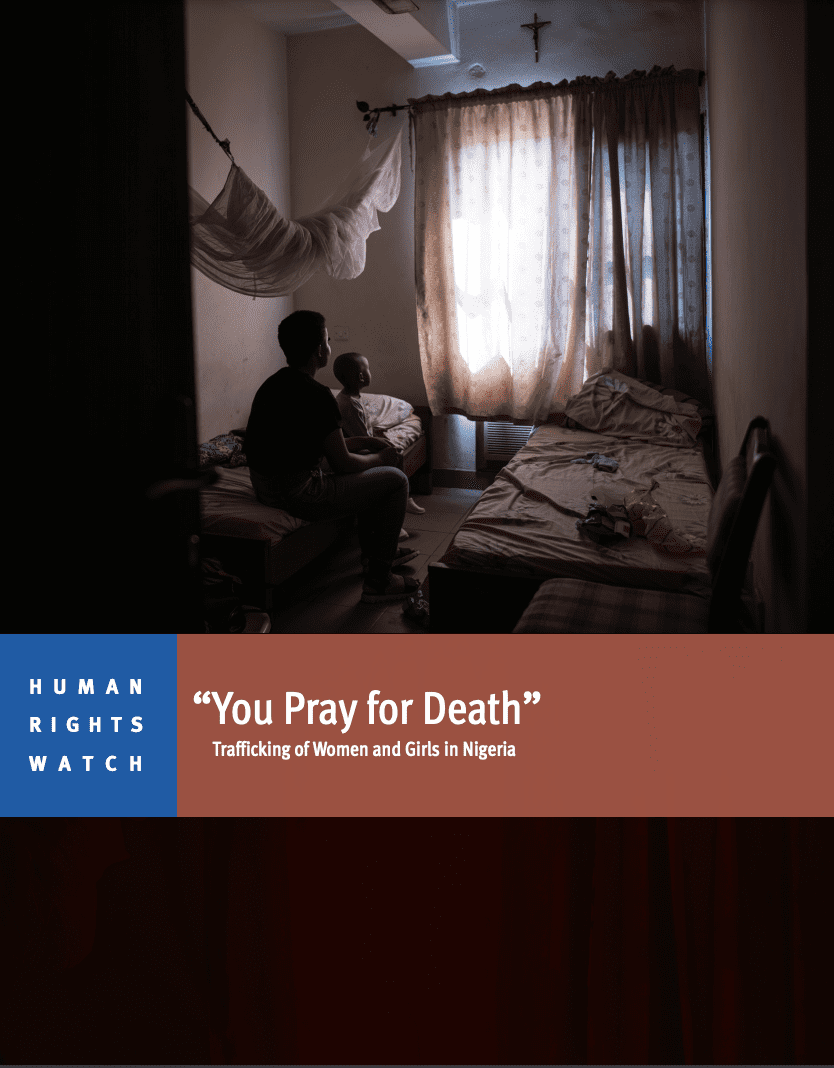
“You Pray for Death” Trafficking of Women and Girls in Nigeria
When she was 18 in 2013, Adaura C. met a woman who promised her a job earning 150,000 naira (US$414) as a domestic worker in Libya. Adaura agreed, and the woman made the arrangements for her to travel from Nigeria to Libya. After a long, dangerous journey through the Sahara Desert, witnessing drivers and other men beat and rape women and girls, she arrived in Libya only to find that she had been deceived. The “madam” (a woman who is part of the trafficking ring and controls women and girls) there told Adaura and her friend Jane V.–Adaura and Jane were recruited by the same woman in Nigeria, but traveled separately—to undress and have sex with clients. “We said, ‘We were told we would be house helps,’” Adaura explained. The madam responded, “This is house help.”
The madam locked Adaura in a room without food for four days and threatened to kill her. She told Adaura and Jane that they each had to pay a “debt” of $4,000, to cover travel expenses, and made them swear an oath that they would not run away. Adaura and Jane were now under the control of the madam. The madam brought men to have sex with them without condoms. After a month, Adaura discovered she was pregnant, and the madam forced her to have an abortion.
The trauma and exploitation continued. The madam sold Adaura to a Nigerian man in Libya who also sexually exploited her. After she extricated herself and moved in with a man who said he would marry her, she said the extremist armed group Islamic State (also known as ISIS) abducted them, killed her boyfriend, and only spared her life because she was pregnant. They took Adaura to an underground prison and forced her to marry a man who raped her. Three years into this nightmare, Libyan soldiers helped her escape, and International Organization for Migration (IOM) repatriated her to Nigeria. Since then, Adaura has been staying in a shelter run by the national anti-trafficking agency, and then in an orphanage. She described suffering from physical and psychosocial health problems, and that she sometimes thinks of killing herself. She is unhappy at the orphanage, where the food is inadequate, and her future is uncertain.
For years, local and international media have been awash with such horrifying stories of Nigerian women and girls trafficked for sexual and labor exploitation, and of migrants trapped in Libya in slavery-like conditions or dying as they cross the Mediterranean Sea.
These stories reflect the large and, according to some estimates, increasing problem of human trafficking within and from Nigeria in recent years. What these news reports often leave out are the problems trafficking survivors face when they are identified internally or upon return to Nigeria, where the government’s efforts to protect and assist them too often fail to respect their rights.
This report documents human rights abuses committed against largely Nigerian women and girls who are trafficked for sexual and labor exploitation within and outside Nigeria. It also focuses on the experiences of non-Nigerian women and girls who are trafficked into Nigeria, most of them for domestic servitude. It shows how some assistance measures are further violating survivors’ rights. The report highlights physical, mental, social, and economic impact of these abuses on survivors, and describes significant gaps in, and obstacles to, much-needed support services. It further outlines steps the Nigerian government should take to combat trafficking in persons and provide survivors the medical care, psychological counseling, and financial assistance they need to heal from the trauma and rebuild their lives.
The report is based on interviews with 76 survivors of human trafficking, 20 of them girls between the ages 8 and 17, and with 7 survivors of smuggling, 2 internally displaced persons, and 1 victim of forced marriage. Human Rights Watch conducted the interviews in Lagos (Lagos State), Benin City (Edo State), Abeokuta (Ogun State), and Abuja (Federal Capital Territory), between May 2017 and October 2018. We also interviewed representatives of 21 nongovernmental organizations (NGOs) addressing trafficking and assisting victims, officials of the National Agency for the Prohibition of Trafficking in Persons (NAPTIP), federal and state government officials, and representatives of bilateral and international assistance agencies.
Like Adaura, thousands of Nigerian women and girls have been trafficked within Nigeria, to other countries in Africa, and to Europe in recent years. Many are escaping dire economic situations at home, where jobs are hard to come by. Some are fleeing violent conflicts driven in part by climate change and a scramble over scarce resources, some have suffered exclusion and discrimination that has left them unable to fend for themselves, while others are vulnerable to exploitation as they seek to escape abusive families.
Read more here.
